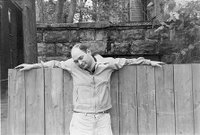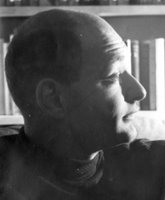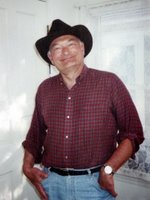
I was just a wee Tufts sophomore, full of nerves, crackling with potential. I had spent yet another summer on my quest to become well read, finishing Madame Bovary at 10 o’clock one night and embarking on Lolita at 10:05, without a break or pause for reflection. I barely knew what was going on. So that September I was determined to get some guidance with three of the biggies on my reading list, Hemingway, Fitzgerald and Faulkner. I showed up at the warm room in East Hall for the first lecture; I wasn’t registered for the class, and would have to talk my way in.
My friend Keith was registered, and he called out to me when I came into the room. I went to sit next to him. He was a scrappy, scrawny kid, with wild curly hair and three months worth of beard. I’d been forewarned by others in my circle that Keith had come back to Tufts a changed man, so I was somewhat prepared for what happened that afternoon. “So, Keith, tell me what happened out there on the road.” He rolled his eyes and laughed, and launched into a scattered retelling of his months hitchhiking across America – need I mention that he had a major literary crush on Kerouac? We’d gotten as far as the farmer who chased Keith with a shotgun when the Professor came in.
Alan paused at the desk and surveyed the packed room – all those young sponges, eager for saturation. The room was a mix of anticipation, the chatter of renewed friendships, and leftover summer heat. Alan looked slightly resigned as he stood there, but once he began speaking, any trace of fatigue dropped away. I couldn’t ever do justice to his introductory lecture on Hemingway, Fitzgerald and Faulkner, so I won’t try. I remember thinking, though, that it was like listening to someone describe his childhood friends, so well did he know the personality quirks of those three men, and so indulgently did he describe their foibles. The classroom was still and silent—except for Keith. He had been rustling and fidgeting throughout the Alan’s introductory remarks, and finally could restrain himself no more. His thin arm shot up.
“My name is Keith, and I signed up for this class because I believe in exposing myself to alternative points of view, but I really don’t agree with all this veneration of Hemingway,” he declared. “I’ve read The Sun Also Rises, and I think Hemingway presents a very narrow and misogynist view of masculinity.”
A garden variety, very undergrad criticism, such as Alan must have encountered many times before. He patiently responded, as he must have many times before. But Keith wasn’t garden variety. Apparently fed up with the constraints of his T-shirt, he pulled it off and continued to argue, bare-chested. “I don’t even think he’s a good writer. He leaves me cold. He’s got no passion. I think Jim Morrison is a better writer than Hemingway any day.”
Alan looked at him for a long minute, bemused. “Not everyone likes Hemingway, but Keith – ‘come on baby light my fire’?”
It shut Keith up for long enough to Alan to move on, but the rest of the class was punctuated with verbal interruptions and physical distractions. Keith at one point started passing notes to me, asking for my opinion on whether real self-expression was possible in an academic setting, or whether we were simply being molded into acceptable shapes, readied for middle-class existence, and taught the permitted scope of thought and conversation. Trying to be a good friend, I wrote back, but I was thinking all the while, oh shit, I’m never going to get into this class now. I had become the friend of the crazy guy.
After the lecture, I went up to plead my case. I was just a sophomore and it was an upper level class, but I’d probably be abroad the next year, I said, and I just couldn’t wait any longer to read these books. The class was already filled past official capacity, but Alan hardly protested. He shook his head, saying, “Oh, all right.” And when troublemaking Keith approached, he didn’t try to talk Keith out of his life, either. “You obviously come into this with little love for the authors,” he said slowly, with half a smile. “But stick around, you might learn something.”
That was my introduction to Alan, and the first of many examples of his generosity – he always had time for one more student. Keith stayed in the class, and even wrote most of his papers. The next year I applied for Alan’s advanced fiction writing course, and got in. I had the great pleasure of sitting around a conference table week after week, learning how to really read a short story. “No one is allowed to be a shit,” Alan said on the first day, and nobody was—but Alan was hard on us when he knew we could take it and when our stories deserved it. I told my friends that my deliberate, heavy-jawed professor was like a bulldog—he would sink his teeth into a piece of writing and shake it until we could all see exactly where it fell apart. It was in that fiction writing class—which I took two more times senior year—that I began to think I could maybe be a real writer one day.
I’m a journalist now, which feels like halfway there. I’ve neglected fiction writing over the past six years, but console myself with the thought that I’m accruing life experience. Maybe I’ll make it the rest of the way someday. If so, one guess whom I’ll have to thank.
 Alan was the chairman who hired me to teach at Tufts back in the early '80's. I've since taught poetry & poetry writing all over the country & had at least twenty bosses & none are near my heart the way Alan is, but I never thought of Alan as a boss. He was a friend & a fellow teacher. I never asked him for any help he didn't give, & in a thousand small ways he made me & my wife Franny feel totally at home at Tufts, a place it took a huge-hearted genius like Alan to make me feel at home at. I'd been teaching at Wind & Dust Tech (Fresno State), & my students were working class & pissed off, & I was working class & pissed off, but Alan made me feel comfortable. I have many warm memories of the man, the wonderful dinners he treated us to, the promises he made when he hired me & always kept, the interesting people he introduced me to--T.J. Anderson, in music, for example, who has become a friend for life. One memory in particular stands out. Jay Cantor, Linda Bamber, Alan, & I made up a committee to chose a a second poet to teach at Tufts. Jay & Alan had set their sights on a fine young male poet. I was with Linda: the poetry writing class were two-thirds women, they got me one semester, so--yes--let's get a woman poet for the other semester. Jay & Alan were solid in their choice. We sat there deadlocked for fifteen minutes or so, & then Linda said without the least drama that she believed that had she had the model of a woman fiction writer during her student years she might have followed her natural bent & become a novelist. She added, "I feel strongly about this." Ten seconds later Alan--who was the chair, the boss--said, "I hear you Linda; I'm changing my vote." That was about 1985; I'd been teaching since 1955 & in fact I'm still teaching, & it's the only example I can recall of a chairman actually listening to a teacher. A soulful, rational decision from achairman. Astounding. Enjoy your retirement, friend.
Alan was the chairman who hired me to teach at Tufts back in the early '80's. I've since taught poetry & poetry writing all over the country & had at least twenty bosses & none are near my heart the way Alan is, but I never thought of Alan as a boss. He was a friend & a fellow teacher. I never asked him for any help he didn't give, & in a thousand small ways he made me & my wife Franny feel totally at home at Tufts, a place it took a huge-hearted genius like Alan to make me feel at home at. I'd been teaching at Wind & Dust Tech (Fresno State), & my students were working class & pissed off, & I was working class & pissed off, but Alan made me feel comfortable. I have many warm memories of the man, the wonderful dinners he treated us to, the promises he made when he hired me & always kept, the interesting people he introduced me to--T.J. Anderson, in music, for example, who has become a friend for life. One memory in particular stands out. Jay Cantor, Linda Bamber, Alan, & I made up a committee to chose a a second poet to teach at Tufts. Jay & Alan had set their sights on a fine young male poet. I was with Linda: the poetry writing class were two-thirds women, they got me one semester, so--yes--let's get a woman poet for the other semester. Jay & Alan were solid in their choice. We sat there deadlocked for fifteen minutes or so, & then Linda said without the least drama that she believed that had she had the model of a woman fiction writer during her student years she might have followed her natural bent & become a novelist. She added, "I feel strongly about this." Ten seconds later Alan--who was the chair, the boss--said, "I hear you Linda; I'm changing my vote." That was about 1985; I'd been teaching since 1955 & in fact I'm still teaching, & it's the only example I can recall of a chairman actually listening to a teacher. A soulful, rational decision from achairman. Astounding. Enjoy your retirement, friend. 


